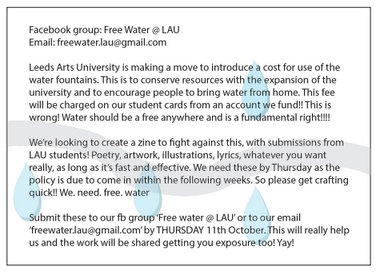- One thing we wanted to draw attention to was that people are likely to believe anything from an authority figure, disregarding their logic and reason. Perhaps this experience will make people reconsider what they trust, encouraging them to think independently.
- Water is something we very much take for granted and the idea of paying for it unthinkable! But it many countries this is the expectation. Perhaps this will make people reconsider the value of a water fountain, making them less inclined to buy bottled water.
- Another point we wanted to make was that an outrageous statement, such as 'we will make you pay for water' is something entirely impossible, having tap water available a legal requirement. But because it is sensationalised people are likely to pick it up, discuss it, pass it on - this encourages agencies of information to 'up the ante' and exaggerate basic information, just to gain significant interest (i.e. Buzzfeed.) In reality we should value the factual information most, to have the most accurate perspective on life we can. Instead we choose to give into 'hot gossip' because it is unexpected and takes us away from 'day to day' life.
We had to consider how this will play out ethically, given that many people were likely to get angry about this if it was believed as fact. Using the LAU branding to convey a policy is definitely unethical. For the purpose of the brief we chose to overstep this, but problems did arise because of it.
- Assuming the identity of an institution can be problematic for its reputation. The 'Water Tax' was so outrageous we hoped that if anyone outside of the university became aware of it they would assume it wasn't real, but if they had believed it, the university would have been obliged to respond. In real life, if a controversial policy was being brought through, an intricate setup would have come before it to 'cushion' the introduction.
- Using their brand was also an infringement of copyright, and if this was applied in an outside setting, there could have been serious consequences.
- Another ethical consideration was how the students would respond to the news. Telling them something is truth and then revealing it as fake, can seem unfair. In somewhere like their university they don't expect to be weary of the legitimacy of what they're reading. Ethically it is wrong. Fortunately the topic was something that didn't involve anything personal, water is something of a necessity but I wouldn't say people are 'emotionally attached' to it. This meant their response was only that of annoyance and easily rectified once the experiment was over.







